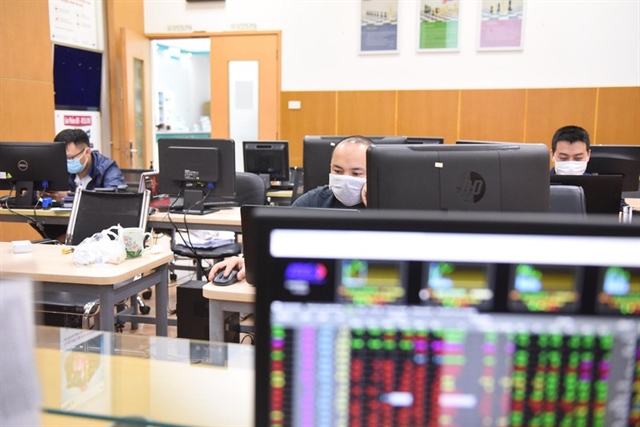 Economy
Economy


|
| Investors follow stock indices at a securities company. KB Securities Vietnam Co (KBSV) forecast that earnings from the proprietary trading of securities companies would achieve good growth in the second quarter of 2020. — Photo tinnhanhchungkhoan.vn |
HÀ NỘI — Vietnamese securities companies have forecast positive second-quarter earnings from proprietary trading following a rocky few months in which they grappled with the COVID-19 crisis undermining the stock market and the economy.
In March, Việt Nam's stock market suffered a substantial drop with the benchmark VN-Index plunging 25 per cent. But since the end of March, the index has rebounded by 27 per cent.
KB Securities Vietnam Co (KBSV) forecast that earnings from the proprietary trading of securities companies would achieve good growth in the second quarter of 2020.
According to KBSV, securities companies recording large results of fair value through profit or loss (FVTPL) of financial assets at the end of the first quarter were Saigon Securities Incorporation (SSI), VNDirect Securities Corporation (VNDS) and Viet Capital Securities JSC (VCSC).
At the end of the first quarter, SSI was holding a list of listed shares worth more than VNĐ2 trillion, most of which were stocks in the VN30 basket which comprises the performance of the 30 largest stocks by market value and trading liquidity. Shares of FPT Corporation accounted for nearly 14 per cent of SSI's portfolio.
Unlike SSI, VNDirect did not promote investment in stocks in the VN30 basket. By the end of the first quarter, VNDirect owned more than VNĐ1.1 trillion of fair value through profit or loss (FVTPL) of financial assets, including both listed and unlisted stocks.
For listed stocks, VNDirect focused on small and mid-cap stocks such as Post-Telecommunication Joint Stock Insurance Corporation (PTI), with 23.8 per cent and Lộc Trời Group Joint Stock Company (LTG), with 10.2 per cent.
As for VCSC, the company allocated its portfolio into various stocks, focusing on real estate such as Khang Điền House Trading and Investment JSC (KDH), Sài Gòn Thương Tín Real Estate JSC (SCR) with the proportion of 14.1 per cent and 23 per cent, respectively. In addition to these stocks, VCSC also holds a small amount of Military Bank (MBB), Cotec Construction Joint Stock Company (CTD), dairy firm Vinamlik (VNM) and budget airline Vietjet (VJC).
Positive prediction
According to KBSV, securities companies forecast positive business results in Q2 thanks to favourable market conditions.
Commercial banks have reduced deposit rates so they can lower lending rates to support the economy after the COVID-19 pandemic. This is expected to boost investments in the stock market.
According to the Vietnam Securities Depository (VSD), as of May 31, there are more than 2.5 million domestic trading accounts on the Việt Nam’s stock market, mostly individual investors.
Compared to April, more than 34,000 domestic trading accounts were newly opened, a record compared to the same period of previous years. In three months of March, April and May this year, more than 102,700 domestic trading accounts were opened, the majority individual investors.
Market liquidity and margin loans of securities companies all increased significantly. According to KBSV, from the beginning of April to June 18, the total trading value on the three floors of HOSE, HNX and UPCoM reached nearly VNĐ305 trillion, up 35 per cent compared to the second quarter of last year and up 33 per cent compared to the first quarter of this year.
This showed the cash flow pouring into the stock market is increasing sharply as investors pin hopes on the recovery of the economy as well as business restoration, KBVS said.
KBSV expects that in Q2, total trading value on the three exchanges may reach VNĐ332 trillion,an increase of 48 per cent year-on-year.
The increase in trading value also resulted in the growth of margin loans at securities companies, with an average increase of 20 per cent in some companies compared to the first quarter this year, KBSV said. — VNS




